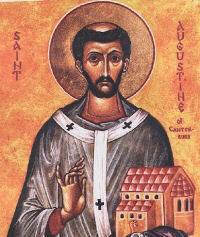Read online
With Fearful Joy and Joyful Fear
The Mission of St Augustine of Canterbury
In the year 597 a monk by the name of Augustine from the monastery of Saint Andrew in Rome was sent by Pope Saint Gregory the Great to preach the gospel in England. Then England was much different from what it is today and with a number of kingdoms within it. Augustine obeyed and after a long and arduous journey he made it together with some colleagues to this country. He was helped by King Saint Augustine of Canterbury. Augustine converted many to the Catholic faith and set up some dioceses especially in the kingdom of Kent, the southeast of the country.
We still have to this day some letters that Pope Gregory wrote to Augustine who did face his share of problems in his apostolate, not least going into exile and facing opposition of many sorts. On coming across one of these letters some weeks ago I was struck with the words of encouragement the Pope wrote to this missionary. At one point he wrote, “This heavenly gift must cause you fearful joy and joyful fear”. He was referring to the gift of the gospel being spread among the English people, or the Angles as they were called at that time. He then goes on to explain why the ‘fearful joy’ and why the ‘joyful fear’. The joy was because through that missionary work so many English people were receiving the grace of God. The fear was then related to the missionaries themselves. It was the fear that some may be rather weak and ‘may become elated and presumptuous’ at the wonderful work they were doing, but which then leads one “to fall inwardly into vain glory”.
I thought these words by the Holy Father written around 1400 years ago still appeal to any missionary today. I feel they apply to all members of our Society working in the apostolate of the proclamation of the Word, not least us in England of the 21st century. It is interesting how Pope Gregory qualified the words ‘joy’ and ‘fear’. I suppose he wanted to put together these two realities which never fail to be present in anyone working in the Lord’s field. There is joy in all of us any time that we see good ‘results’ or the ‘fruits’ of our work. In our case here in London it would be seeing the children receiving the sacraments of Confession, Communion, Confirmation and even Baptisms. Or it could be the group of young people who still come for our meetings after confirmation, or the other meetings for parents and so forth. It is a joy because you see people getting nearer to God in a country where God seem not to exist anymore or it has been replaced by so many other idols. Ironically in his letter Pope Gregory also referred to the ‘idols’ that the English served before Augustine came.
But there is fear as well in our lives, and this can take various forms. The one that Gregory was writing about however was about that concept that was so often stressed by our founder - vain glory. In fact, he wrote to Augustine that it is only by the power of God and not by the wisdom of men that the world is converted, saying that God chooses “unlearned men to be his preachers and send them into the world”. Again, I believe it is a word of warning that applies to us as well. After all we all know what Jesus’ reply to the apostles was, when they returned to him joyfully from their preaching saying that even the demons had been subject to them. The Lord’s words were clear, “Do not rejoice because of this, but rather rejoice because your names are written in heaven”.
A long time has passed since Augustine came to England. Times have changed and so have people and a thousand other things. But surely some underlying truths are still the same as they were then. The good and evil around us, or the false gods that people adore, or the lack of workers for the Lord’s vineyard. I’m sure that from heaven Augustine intercedes for us who are living so many years later but doing similar work to his. He is after all one of the patron saints of our diocese. May the words about joy and fear that he received from his Pope and which he so dearly accepted be also in us all, wherever we are. After all isn’t it the same Word that we are trying to proclaim? And doesn’t also Pope St John Paul II speak about similar thoughts like ‘Do not be afraid’ and ‘Crossing the threshold of Hope’?


Follow us on